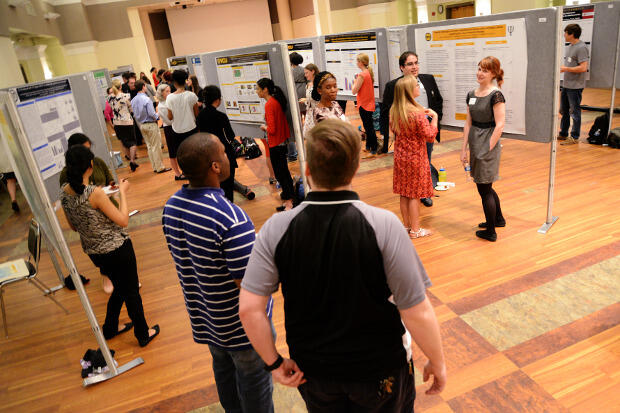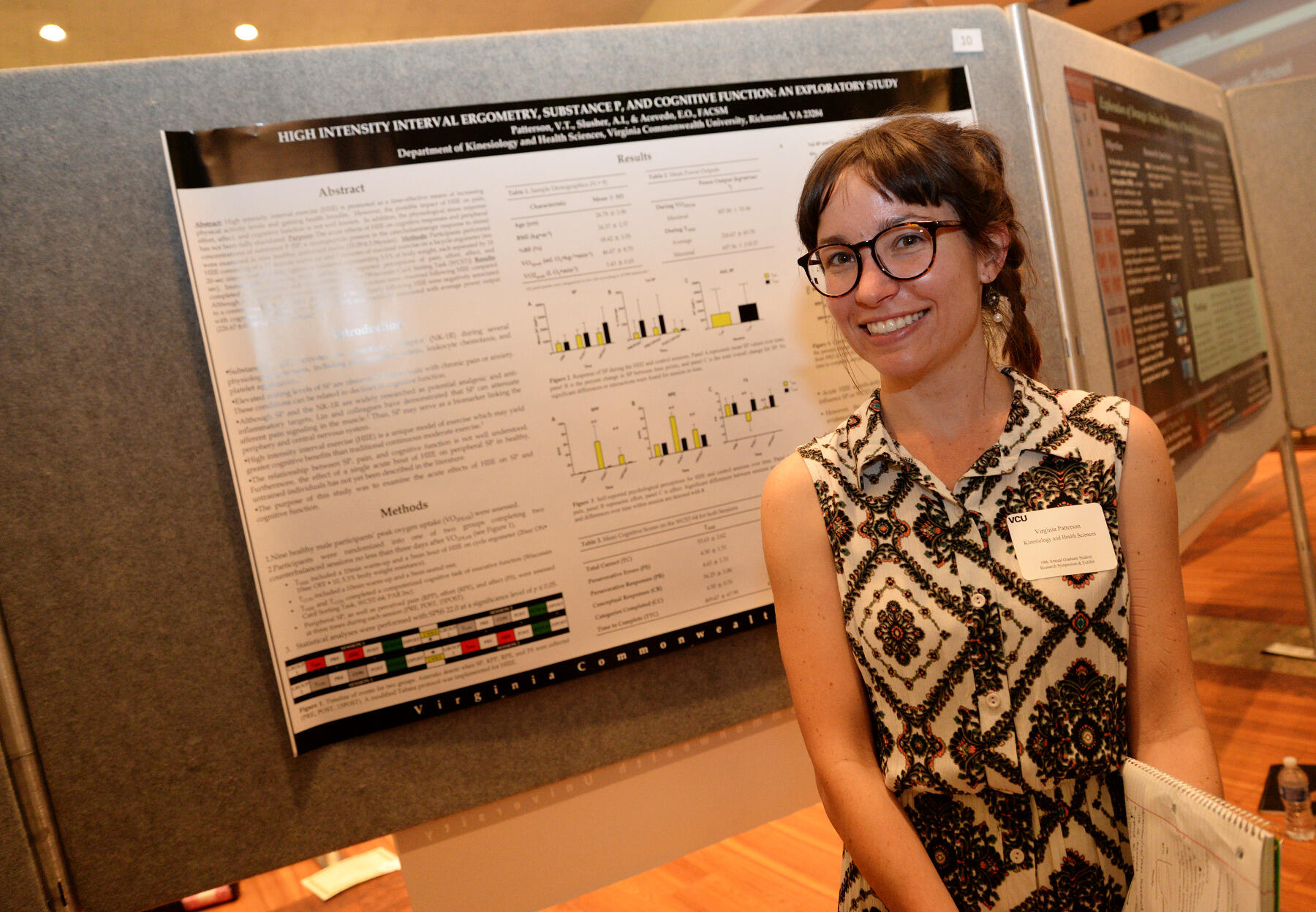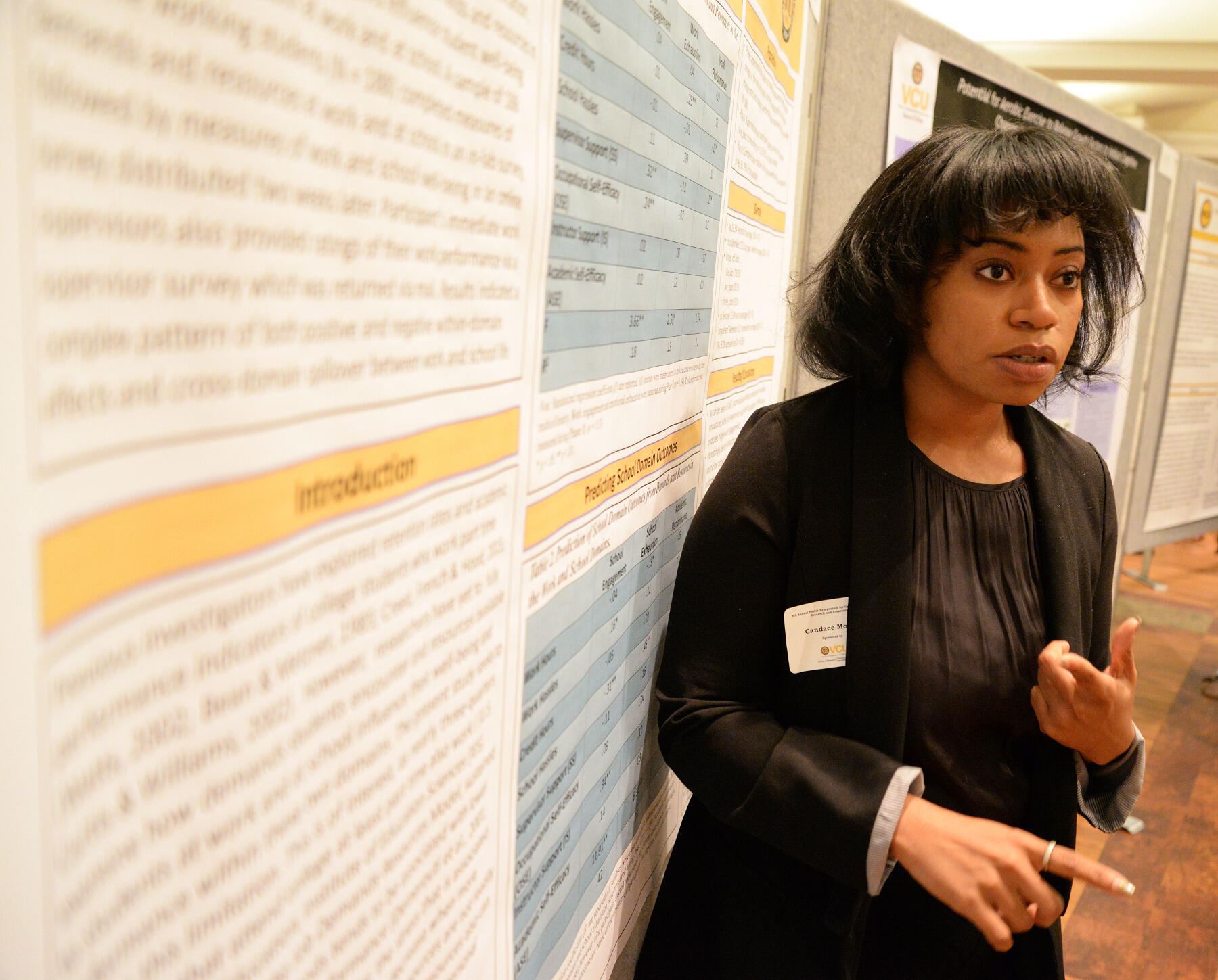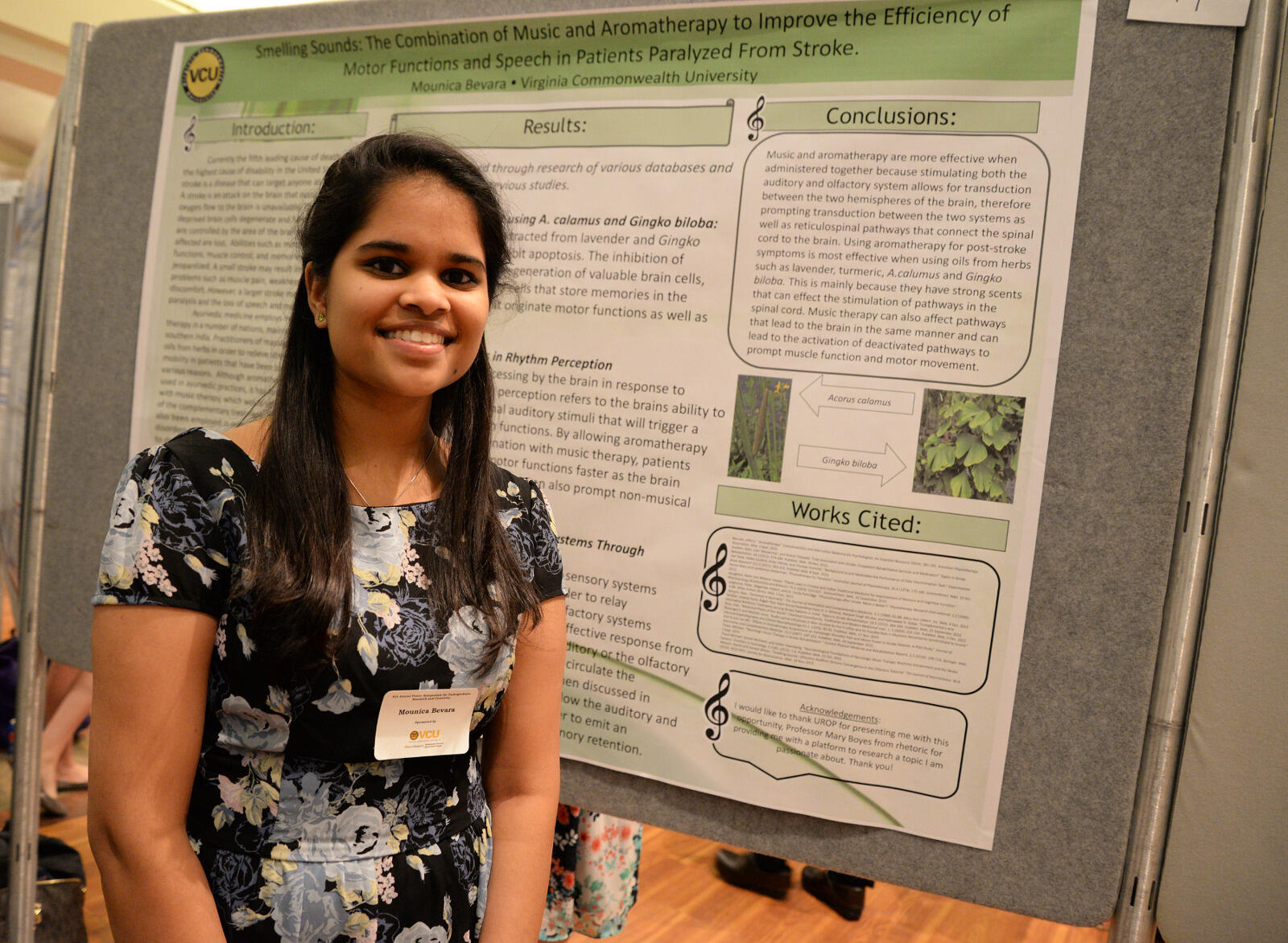
April 29, 2016
Students present research projects that merge academic and personal interests during annual symposiums
Share this story
Virginia Patterson believes exercise saved her life. With that in mind, she often finds herself considering how it can help save the lives of others. Patterson, a Ph.D. student in the Department of Kinesiology and Health Sciences, part of the College of Humanities and Sciences, searches for ways to help people find the kind of reward in physical fitness that has enriched her own life.
Before she embraced serious exercise, Patterson said, she was unmotivated and directionless. As she became more devoted to a regular exercise regimen, she found her mood improved substantially, particularly when she was pushing herself.

“Exercise really helped me sink my teeth into that move forward,” she said. “I could see that I could keep getting better.”
Patterson is studying the cognitive effects of intense periods of exercise, particularly on those who are generally sedentary and inactive. She wants to know if people benefit mentally and emotionally in the immediate aftermath of serious exercise, even if they feel preoccupied with their physical pain.
Patterson said her research so far has indicated that intense exercise amounts to “good stress,” whether the subjects are feeling physically ill from it or not. “It doesn’t care how you feel,” she said. “You’re getting benefits from it whether you like it or not.”
Patterson was one of hundreds of students who showcased their ongoing and completed research projects during the 19th Annual Graduate Student Research Symposium and Exhibit and the 10th Annual Poster Symposium for Undergraduate Research and Creativity, held on back-to-back days in the University Student Commons last week. Students from both campuses and a diverse range of disciplines presented their research, mingling with each other among poster boards to explain their work to visitors and to learn about the efforts of their peers. Some of the students conducted solo research projects, while others were parts of teams that included other students and faculty members.
<slideshow id=135 align=center width=620>
The symposiums, which are central components of the annual Research Weeks at VCU, provide students at all levels of their education — from freshmen to Ph.D. candidates — with the opportunity to present and explain their research to a captive audience.
In line with Patterson’s experience, students frequently had both personal and academic foundations for their research projects. Diana Naidoo, an undergraduate student in the School of Nursing, was born prematurely and has always been interested in the topic of preterm labor. She was part of a team examining the effects of guided imagery stress management on pregnant African-American women. Guided imagery uses words and music to create positive mental images for subjects.
Stress is considered a major factor in negative birth outcomes, including premature births, and black women are particularly susceptible. Naidoo, an Undergraduate Research Opportunities Program scholar, said her research indicated that guided imagery did reduce stress in the women involved, suggesting that it is a possible low-cost option that deserves more study.
Naidoo said she hopes to continue to conduct research during her nursing career. As a nurse, she said, you interact closely with patients and “can tease out how their lives relate to their medical situation.” Naidoo would like to be able to take what she learns from her patients and pursue research that relates to the issues they are facing.

Candace Moore hopes to use her research experiences as a springboard in her academic career. Moore is one of the researchers on the project “Balancing Work and School: Evaluating the Experiences of Students Who Work While Enrolled.” The study examines the effects of part-time work on job and academic performance.
Moore, who said 76 percent of college students work at least one part-time job, volunteers as a caregiver for a disabled veteran, serving approximately 25 hours per week, and knows how outside responsibilities can threaten to hinder school performance. The study incorporated a survey of students’ supervisors at work, and it revealed, among other findings, that a supportive supervisor proves critical to a student’s academic performance.
Moore said research projects are rewarding experiences that require teamwork, creativity, curiosity and attention to detail. She is majoring in psychology and science, with a concentration in health preparation/professional science, and minoring in biology and chemistry. Although not scheduled to graduate until 2018, Moore has already participated in multiple research studies. She hopes to attend medical school one day and will be transitioning to working on biomedical research at VCU with her remaining undergraduate experience.
Jessica Greenlee’s research, “Relations Between Social Skills and Bullying Behaviors Among Students with Disabilities: The Role of Effective Nonviolent Behaviors,” examines the experiences of students with disabilities in an urban public middle school. Greenlee is pursuing a Ph.D. in developmental psychology.
“I’m really interested in kids with disabilities and how they handle social challenges,” she said.
Presenting it here is a real highlight for me.
Greenlee’s study will help illuminate how well certain strategies work for children who are at risk of bullying. She said she found strong mentorship and collaborative instincts within her department to support her research pursuits, and she plans to use the study she presented at the graduate symposium as the starting point for her dissertation. However, it was also its own reward.
“Presenting it here is a real highlight for me,” she said.
Anson Blanks, who is pursuing a Ph.D. in kinesiology and health, conducted his research in the same lab as Patterson. He examined the use of the exercise recovery index as an assessment of cardiovascular disease risk. Blanks said the study was not a direct match for the lines of research he hopes to pursue in the future, but navigating the process of designing and implementing the study and managing its results and presentation were invaluable.

“Even if the topic isn’t exactly what I plan to do, the experience of going through it was very helpful to me,” he said.
Mounica Bevara, a biology major and member of the Honors College, played violin for eight years and that background informed her study, “Combination of Music and Aromatherapy to Improve the Efficiency of Motor Functions and Speech in Patients Paralyzed From Stroke.” Bevara said physiotherapy treatments for patients who were paralyzed following a stroke are long and rigorous — and expensive. Bevara explored whether music therapy and aromatherapy could aid the process.
Bevara, who is just a freshman, conducted the research for a class. She did not expect to enjoy the process as much as she did.
“I definitely think it has been a great opportunity for me to expand my knowledge,” she said. “Before this, I wouldn’t have considered doing research.”
Subscribe for free to the weekly VCU News email newsletter at http://newsletter.news.vcu.edu/ and receive a selection of stories, videos, photos, news clips and event listings in your inbox every Thursday.
Subscribe to VCU News
Subscribe to VCU News at newsletter.vcu.edu and receive a selection of stories, videos, photos, news clips and event listings in your inbox.













